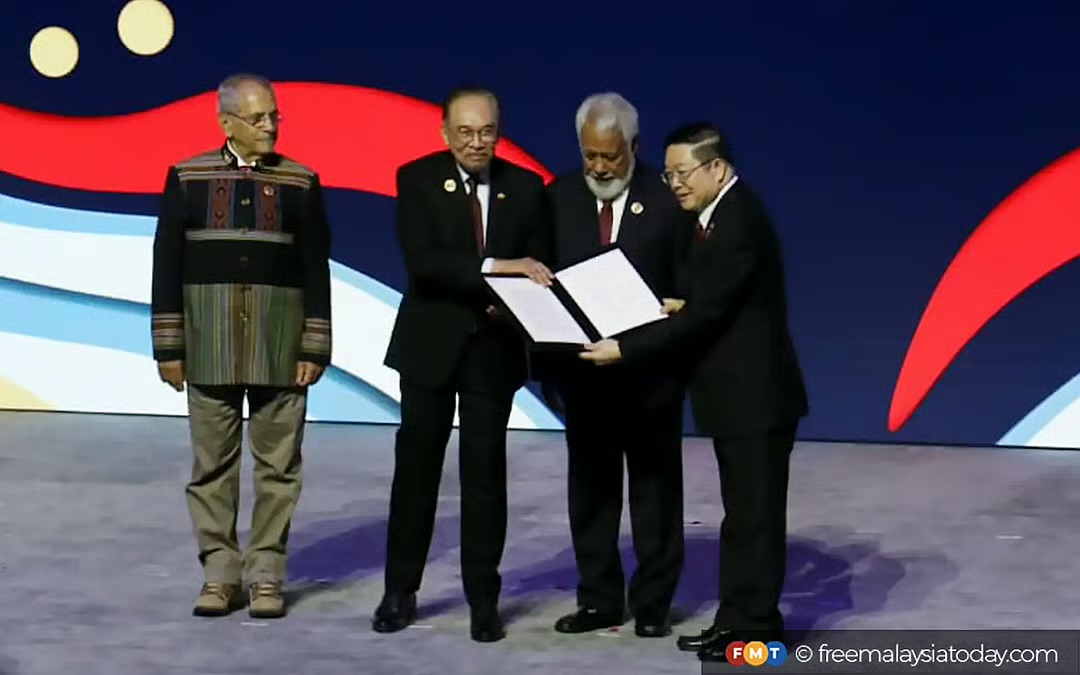East Timor fully joins ASEAN: peace, unity and a shared destiny
Yesterday, Dili officially became the 11th nation in the Southeast Asian bloc. The end of a 14-year journey was marked by a highly symbolic ceremony attended by all regional leaders. Prime Minister Rala Xanana Gusmao was the last to add his signature. Challenges and responsibilities related to inclusion remain.
Kuala Lumpur (AsiaNews) - Yesterday, East Timor officially became the 11th member of ASEAN, the association of Southeast Asian nations, after signing the declaration of accession at the 47th summit held from 26 to 28 October in Kuala Lumpur, Malaysia. This marks the end of a 14-year journey towards full membership of the Asian bloc.
In a highly symbolic ceremony, all 10 current ASEAN leaders signed the historic document, with East Timor's Prime Minister Kay Rala Xanana Gusmao adding his signature last. Moments later, the country's flag was raised alongside those of the other member states, vividly symbolising its official entry into Southeast Asia's main regional political and economic bloc.
Malaysian Prime Minister Anwar Ibrahim, who chaired the summit as ASEAN's rotating chair, called the accession ‘the completion of the ASEAN family,’ saying it reaffirms the region's common destiny and deep sense of kinship. Gusmao, visibly moved in his first speech as leader of a member country, said that this milestone represents not only the realisation of a dream, but also ‘a powerful affirmation of our journey characterised by resilience, determination and hope’.
Timor-Leste, which regained independence from Indonesia in 2002 after decades of struggle, first applied for membership in 2011. In 2022, it was granted observer status and has since worked steadily to align its governance, economic and socio-cultural frameworks with the three fundamental pillars of ASEAN.
For Joanne Lin, senior fellow at the Singapore-based ISEAS-Yusof Ishak Institute, membership – and full membership – is “more than symbolic”. “It completes the map of Southeast Asia and demonstrates ASEAN's commitment to inclusiveness and regional identity, themes strongly emphasised under Malaysia's chairmanship this year,” she told reporters in Kuala Lumpur. The expert added that it will reshape the internal dynamics of the association, introducing a new voice into its consensus-based decision-making process and bringing valuable insights from its experience in post-war reconstruction and democratic transition.
However, despite the sincere celebrations, some observers have also warned of risks and critical issues, foremost among which are the economic disparities in the region that could threaten cohesion. Ilango Karuppannan, former Malaysian High Commissioner to Singapore, said that ASEAN must act quickly to reduce the development gap between its members, otherwise it risks exacerbating divisions. ‘If we do not act, ASEAN could evolve into a three-tiered community of wealth, with East Timor falling even further behind,’ he warned. ‘We do not want these divisions to become a structural problem that weakens the unity’ of the bloc, he continued. For East Timor, today marks both an arrival and a beginning: welcome into the ASEAN family and the reminder that inclusion brings responsibility, not just celebration.
Colonial beginnings
East Timor, now Timor-Leste, was a Portuguese colony for over four centuries. The western half of the island belonged to the Dutch East Indies (now Indonesia), while the eastern half remained under Lisbon's control. When the Portuguese dictatorship fell in 1974, the colonies began to push for independence and Timor-Leste experienced a brief moment of freedom.
On 28 November 1975, the Timorese nationalist party Fretilin (Revolutionary Front for an Independent East Timor) declared independence from Portugal. However, just nine days later, Indonesia invaded its neighbour on the pretext of preventing the spread of communism. From there, the invasion turned into a 24-year occupation characterised by brutal repression, famine and tens of thousands of deaths. The United Nations never recognised Indonesia's annexation.
During the occupation, Timorese resistance fighters waged a guerrilla war under the leadership of figures such as Xanana Gusmão and José Ramos-Horta. In 1991, Jakarta's troops opened fire on mourners at the Santa Cruz cemetery in Dili, an event captured by foreign journalists. The massacre shocked the world, tearing away the veil of silence surrounding the brutal occupation and reviving international support for East Timor's independence.
Referendum and independence
After the fall of Suharto's Indonesian regime, a UN-sponsored referendum was held in August 1999. Nearly 80% of voters voted for independence, triggering violent reprisals by pro-Indonesian militias during which more than a thousand people were killed and much of the country's infrastructure was destroyed. An international peacekeeping force restored order and the United Nations administered the territory until it achieved full independence on 20 May 2002. Xanana Gusmão became its first president; José Ramos-Horta, Nobel Peace Prize winner, served as foreign minister and then president.
The years following East Timor's independence were marked by political instability, poverty and occasional unrest, but also by great resilience. The country, rich in spirit but poor in infrastructure, began to rebuild its institutions, economy and identity, often with the help of neighbouring ASEAN countries. However, despite being geographically and culturally part of Southeast Asia, it remained outside the bloc, observing its growth and evolution from afar.
Timor-Leste formally applied for membership in 2011. Concerns about its administrative capacity and economic preparedness slowed the process, as the bloc operates on the basis of consensus and its members wanted to ensure that the newcomer would be able to fulfil its obligations. In 2022, the country was granted observer status and began participating in meetings, aligning its systems with the bloc's three pillars: political-security, economic and socio-cultural.
Finally, today, after years of preparation and goodwill diplomacy, Timor-Leste signed the declaration of accession, becoming the bloc's 11th member. For a nation once silenced by Indonesian occupation, today's accession marks the symbolic completion of a long journey from colonial rule and conflict to regional cooperation and recognition. It is not only the culmination of Dili's dream of “coming home” to Southeast Asia, but also a reminder of what ASEAN itself represents: peace, unity and a shared destiny.
20/07/2022 15:40







.png)










